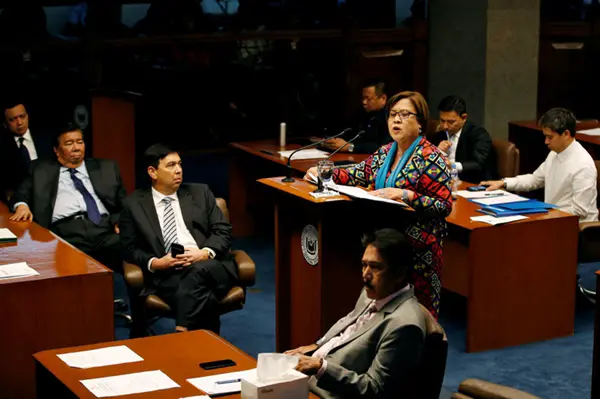For one outspoken critic of President Rodrigo Duterte’s deadly antidrug campaign in thePhilippines, the denouement came quickly.
Within 24 hours, the critic, Senator Leila de Lima, was stripped of her post as chairwoman of the Senate Justice Committee, which recently had heard damning testimony from a professed Duterte hit man, and the House of Representatives opened hearings on allegations that she had received payoffs from drug lords.
Speaking on the Senate floor, her voice catching at times, Ms. de Lima said on Tuesday that she was the victim of a “new McCarthyism” aimed at ending her inquiry into the president’s possible role in extrajudicial killings.
“Many friends and colleagues have told me, if only I did not call out the president on the murderous consequences of his war on drugs, and decided to be as meek as a sheep, I would not be in this trouble,” she said.
Edwin Lacierda, the spokesman for former President Benigno Aquino, called the attacks on Ms. de Lima an “unprecedented, brazen power play” to silence her.
If that was the rationale, it mirrors similar efforts by Mr. Duterte and his allies in recent days to attack critics of his drug policy, including the United Nations, President Obama and the foreign news media. But Ms. de Lima has been Mr. Duterte’s most prominent domestic critic, and if her voice is muted, there is no one of her stature left standing among the opposition.
Mr. Duterte has widespread support — measured at 91 percent in a July Pulse Asia opinion poll — and even some advocates who are normally outspoken have maintained an uncharacteristic silence since he took office. He had previously tried to quiet Ms. de Lima by accusing her of adultery and said at one point that she should hang herself.
But Ms. de Lima persisted, and her difficulties with her colleagues came to a head last week when she called a professed former assassin, Edgar Matobato, as a witness before her committee.
Mr. Matobato testified that Mr. Duterte had ordered the killing of about 1,000 suspected criminals and political opponents while serving as mayor of Davao City, the position he held until he became president in June. One victim was fed to crocodiles, Mr. Matobato said, and others were thrown into the sea.
He testified that he heard Mr. Duterte order some of the killings.
In an interview with The New York Times, Mr. Matobato said that Mr. Duterte was the founder of the Davao Death Squad, the shadowy group believed to have carried out the killings, and that it was largely made up of police officers.
In his first response to the accusations, Mr. Duterte told reporters Monday evening that Mr. Matobato’s testimony was untrue. Ms. de Lima could be guilty of suborning perjury if she knew the witness was lying, said Mr. Duterte, a former prosecutor.
“If you know it’s a lie and you have a person testify, you are an active participant,” he said. “It’s a serious crime.”
Since Mr. Duterte took office, the police have killed more than 1,500 people who they say resisted arrest. There have been another 1,500 unsolved killings, including many victims found with cardboard signs identifying them as drug dealers.
Ms. de Lima said on Tuesday that her hearings had established “an uncanny similarity” between killings committed by the Davao Death Squad and the “current phenomenon” of nationwide extrajudicial killings.
“The implication is that we have a group of serial killers and mass murderers right within the ranks of the organization which is supposed to protect and serve the people,” she said. “I might be jumping to conclusions, but what if it is true?”
Mr. Lacierda said it was Mr. Matobato’s testimony that did her in.
“His testimony confirmed what President Duterte has been casually boasting during the campaign,” Mr. Lacierda said. “For the first time, there was firsthand testimony of the existence of the death squads which media, both domestic and international, would most likely emphasize to the bane of this administration and, hence, must be stopped.”
On Tuesday, a spokesman for Mr. Duterte told reporters that the president had no role in Ms. de Lima’s ouster.
But at the very least, the Senate action illustrates the strong support the president has in Congress, where he has the backing of a majority in both houses.
On Tuesday, the House Justice Committee began hearings on allegations that drug lords received favored treatment in prison while Ms. de Lima was justice secretary, the post she held before winning election to the Senate this year.
Imprisoned drug lords were brought to a House committee room where they testified that they had paid Ms. de Lima more than $20,000 a month to let them live in luxury in prison.
One inmate, Rodolfo Magleo, a former police chief inspector who was convicted of kidnap for ransom, testified that the most powerful prisoners received beer deliveries by the truckload and were allowed to carry guns in prison, likening conditions there to “the Wild West.”
In her speech, Ms. de Lima denied receiving any money from the drug dealers or allowing them to receive special treatment.
She also pushed back at criticism that she had made the Philippines look bad by investigating the killings.
“I am not the one giving a bad image to the country before the international media,” she said. “The real problem of the country and this administration is the extrajudicial killing of more than 3,000 of our countrymen in the past three months.”
(THE NEW YORK TIMES)
 简体中文
简体中文



